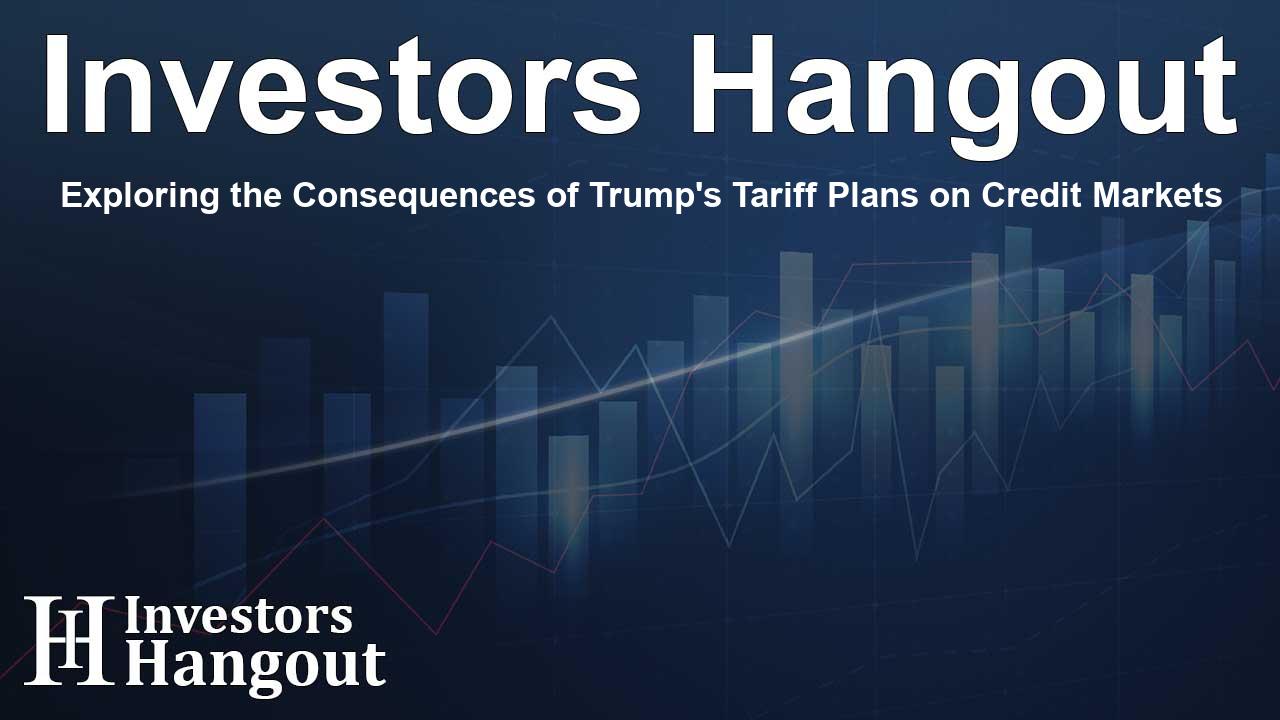Exploring the Consequences of Trump's Tariff Plans on Credit Markets

Understanding Trump's Trade Policies and Their Effects on Credit
Recent announcements from former President Trump regarding proposed tariffs are stirring conversations in financial circles. Trump has expressed intentions to impose tariffs reaching up to 10% on imports globally and 60% specifically on goods from China. Additional surcharges of 25% may be applied to products originating from neighboring countries like Canada and Mexico. These potential measures have left many investors contemplating the far-reaching effects of such policies on credit markets.
The Investor Landscape Amidst Potential Tariffs
Initially, investors viewed Trump's re-election as a gateway to looser regulations and beneficial tax adjustments. However, the introduction of significant tariffs has prompted fears of rekindled inflation, which could strain both consumer finances and government budgets. These concerns raise apprehensions regarding the Federal Reserve’s ability to implement further interest rate reductions in an environment where inflationary pressures could rise.
Federal Reserve's Response to Tariff Proposals
Minutes from a recent Fed meeting indicate confusion among policymakers about the impact of Trump's tariff strategies and the broader international dynamics on inflation. Officials fear that the anticipated easing of inflation to the Fed's healthy benchmark of 2% may face longer delays than expected, potentially complicating monetary policy decisions further.
Market Reactions and Future Projections
The recent Fed discussions have shifted market speculation regarding future interest rates. Investors are leaning towards the likelihood that the Fed will maintain current borrowing rates in their upcoming decisions, with significant adjustments not expected until at least a few months into the current year.
Uncertainty and Economic Emergency Declarations
Market uncertainty escalated when reports surfaced suggesting that Trump might declare a national economic emergency to solidify his tariff plans. This comes amid denials that his administration is considering narrowing the scope of these tariffs to focus only on essential goods.
The Historical Context of Trump's Trade Stance
This is not Trump's first encounter with aggressive trade measures. His previous presidency saw the initiation of a significant trade dispute with China in 2018, aimed at rectifying perceived unfair trade practices. Understanding this background is crucial for anticipating how current and future plans might unfold in the context of international relations.
UBS Analysts Weigh In on Credit Activity Implications
Analysts at UBS, including Matthew Mish, offer insights suggesting that Trump's proposed tariff structures may adversely affect global credit dynamics. They argue that today's credit environment is markedly different from that of early Trump years. They reflect on tighter spreads and slowed global growth, warning that the potential ramifications of such policies may echo previous tariffs faced in 2018, with minimal buffer against geopolitical tensions and economic shocks.
Forecasting Default Trends in Credit Markets
Mish anticipates that while the U.S. may see stable default rates, the European Union might experience increasing defaults due to cooling economic growth and refinancing pressures complicating credit access. He notes that the influence of tariffs and geopolitical strife is likely to resonate more significantly within the EU compared to the U.S. context.
Frequently Asked Questions
How might Trump's tariffs affect inflation rates?
Trump's proposed tariffs could increase the costs of imported goods, potentially raising overall prices and leading to inflationary pressures.
What is UBS's perspective on the credit market outlook?
UBS analysts warn that Trump's tariffs may negatively impact global credit activity, citing tighter credit spreads and slower growth.
Will the Federal Reserve lower interest rates in response to these tariffs?
Given the potential for inflation to rise, the Fed may choose to postpone further interest rate cuts until there is more stability in the economy.
What historical context informs current trade policy evaluations?
Trump previously enacted tariffs in 2018 against China, setting a precedent for his current trade approach and its potential impacts.
Are defaults expected to rise in the EU due to these policies?
Yes, as mentioned by UBS, defaults in the EU could increase due to heightened economic pressures resulting from Trump's tariffs and geopolitical tensions.
About The Author
Contact Ryan Hughes privately here. Or send an email with ATTN: Ryan Hughes as the subject to contact@investorshangout.com.
About Investors Hangout
Investors Hangout is a leading online stock forum for financial discussion and learning, offering a wide range of free tools and resources. It draws in traders of all levels, who exchange market knowledge, investigate trading tactics, and keep an eye on industry developments in real time. Featuring financial articles, stock message boards, quotes, charts, company profiles, and live news updates. Through cooperative learning and a wealth of informational resources, it helps users from novices creating their first portfolios to experts honing their techniques. Join Investors Hangout today: https://investorshangout.com/
The content of this article is based on factual, publicly available information and does not represent legal, financial, or investment advice. Investors Hangout does not offer financial advice, and the author is not a licensed financial advisor. Consult a qualified advisor before making any financial or investment decisions based on this article. This article should not be considered advice to purchase, sell, or hold any securities or other investments. If any of the material provided here is inaccurate, please contact us for corrections.
